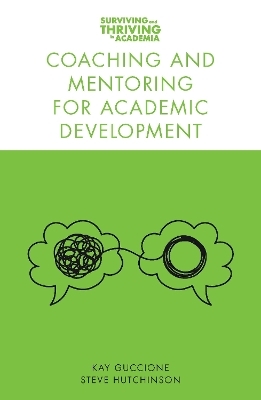
Coaching and Mentoring for Academic Development
Emerald Publishing Limited (Verlag)
978-1-78973-910-7 (ISBN)
Learning through dialogue brings a powerful opportunity for individuals to connect to colleagues, navigate professional demands, and meet the challenges posed by a turbulent world. Written for all who mentor or coach in universities, this book addresses a critical question: how can mentoring and coaching conversations be effective and accessible ways to support researcher and academic development?
Drawing on their wide range of experiences of coaching and mentoring, and designing and leading institutional programmes and policy, Guccione and Hutchinson provide an insight into the founding principles of reflective ethical practice, as well as a pragmatic and easy to navigate toolkit supporting you to understand the needs of the people you want to develop. Including bite-sized chapters packed full of applied solutions, the authors help you to design, re-design, or troubleshoot your mentoring or coaching approach, and offer up go-to guidance for building and enhancing a culture of developmental dialogue at the individual, programme and organisational level.
Kay Guccione is Senior Lecturer in Academic Development at Glasgow Caledonian University, UK. She is a National Teaching Fellow and a Principal Fellow of the Higher Education Academy, known for her work in mentoring, doctoral learning, and PhD supervision. Steve Hutchinson is a freelance Coach and Developer. He has worked internationally helping academic, not-for-profit and corporate organisations deliver sustainable staff and student development, mentoring and training programmes.
SECTION 1 Chapter 1. Coaching and Mentoring: Concepts and Terminologies Explored Chapter 2. Contextualising Mentoring and Coaching - Examining The Role of Universities and Higher Education
Chapter 3. The Academic Context for Mentoring and Coaching
Chapter 4. A Doctorate is no Longer Enough
Chapter 5. Situating mentoring and Coaching within Educational Practice
Chapter 6. Placing the Focus on Planning, not Problems
Chapter 7. Building Repertories of Practice ‘beyond advice’
Chapter 8. Amplifying the Learner’s Voice
Chapter 9. What Makes a Good Coaching Question?
Chapter 10. Using a Coaching Style as Principal Investigator, Supervisor or Manager
SECTION 2
Chapter 11. Creating Agreement and Alignment
Chapter 12. Giving and Receiving Feedback: Coaching Style
Chapter 13. Supporting Through Change and Transitions
Chapter 14. Supporting Personal Development Planning
Chapter 15. Enabling Efficiency and Effectiveness
Chapter 16. Building Productive Writing Habits
Chapter 17. Shaping and Managing Working Relationships
Chapter 18. Gaining First Funding and Research Independence
Chapter 19. Mentoring Career Changers
Chapter 20. Developing Leadership Capabilities
Chapter 21. Sustaining Change Over Time
Chapter 22. Supporting Stressed Colleagues
SECTION 3
Chapter 23. Designing and Launching a Mentoring Programme
Chapter 24. The Reputation of Coaching and Mentoring
Chapter 25. Aligning your Programme with Humanistic Principles
Chapter 26. Designing a Workshop: Orientation to Practice
Chapter 27. How to Recruit, Retain and Develop your Coaches and Mentors
Chapter 28. Enhancing Practice through Peer-Conversations
Chapter 29. Matching Mentoring and Coaching Pairs
Chapter 30. Anticipating Disengagement from Mentoring and Coaching
Chapter 31. Evaluating Mentoring and Coaching
Chapter 32. An Institutional Code of Practice
Chapter 33. How to Find and Recruit your Own Mentor
| Erscheinungsdatum | 23.03.2021 |
|---|---|
| Reihe/Serie | Surviving and Thriving in Academia |
| Verlagsort | Bingley |
| Sprache | englisch |
| Maße | 129 x 198 mm |
| Gewicht | 364 g |
| Themenwelt | Sozialwissenschaften ► Pädagogik ► Berufspädagogik |
| Sozialwissenschaften ► Pädagogik ► Erwachsenenbildung | |
| ISBN-10 | 1-78973-910-1 / 1789739101 |
| ISBN-13 | 978-1-78973-910-7 / 9781789739107 |
| Zustand | Neuware |
| Informationen gemäß Produktsicherheitsverordnung (GPSR) | |
| Haben Sie eine Frage zum Produkt? |
aus dem Bereich


